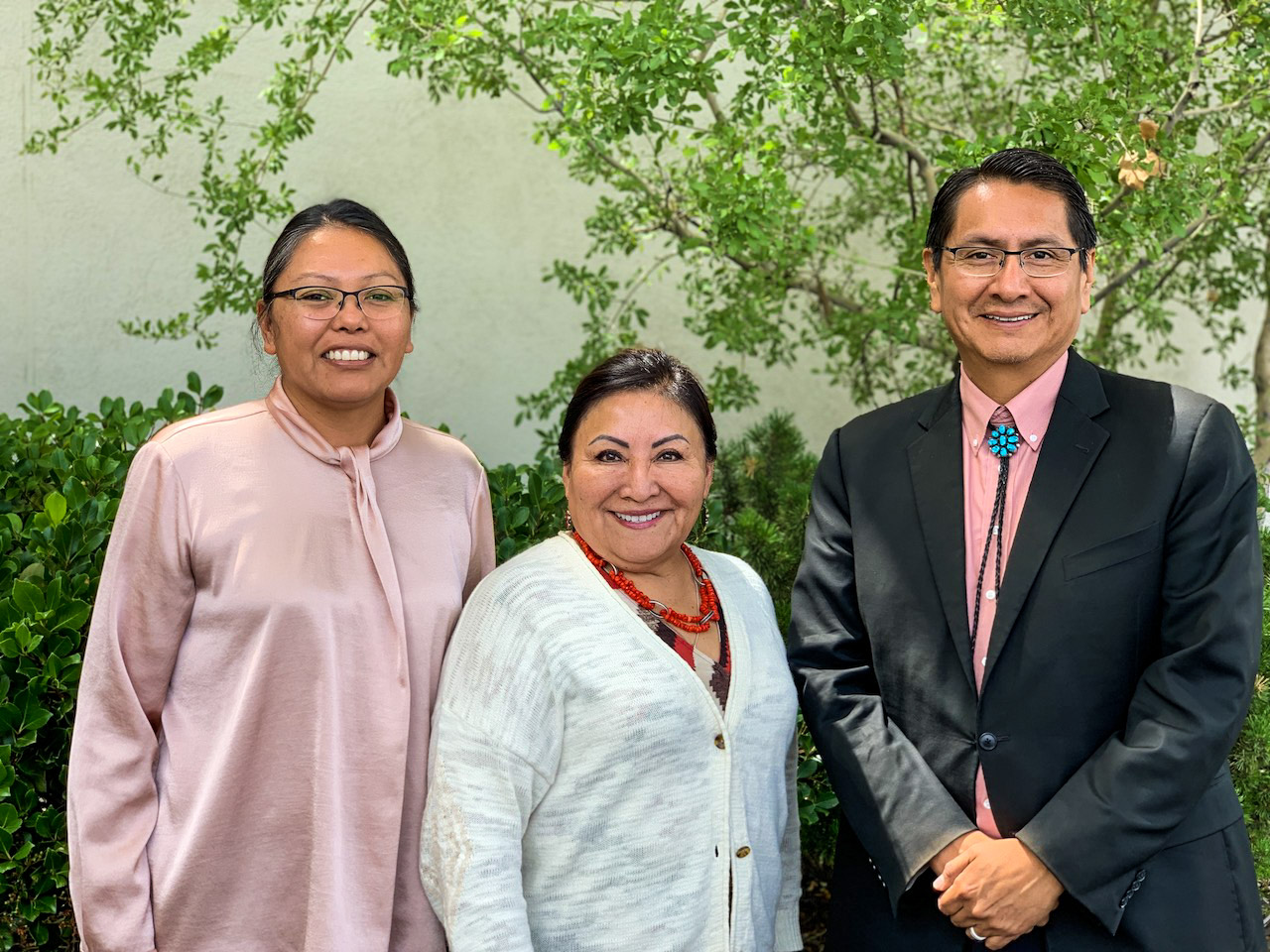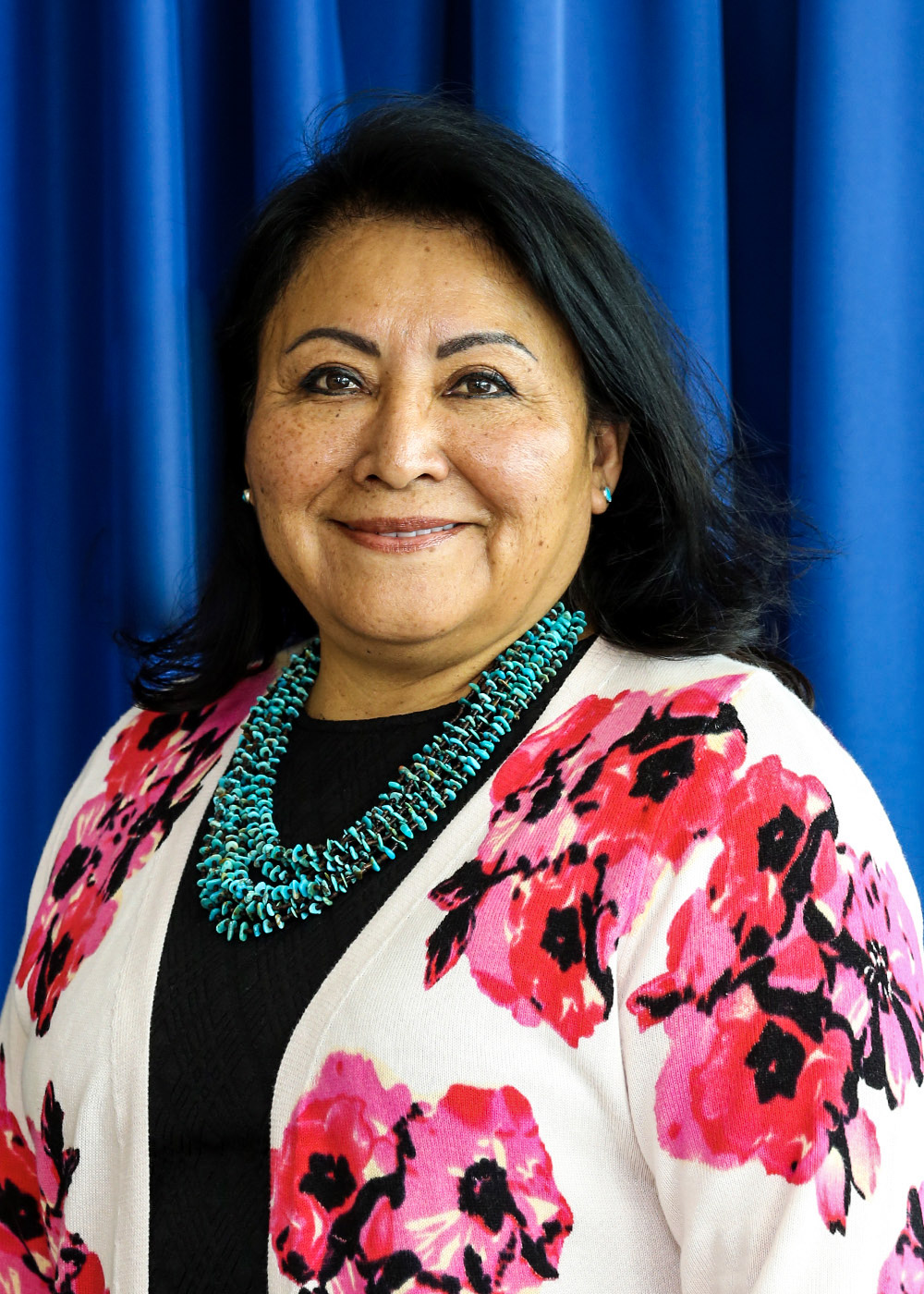
Tso became director of the Navajo Area of the IHS in July 2019. Several months later, the largest reservation in the United States saw the arrival of the coronavirus, which has affected her people at disproportionate rates. But Nez said Tso’s efforts have helped keep people safe on the Navajo Nation. The tribe has one of the highest rates of vaccination for COVID-19 and case numbers continue to trend downward, two years into the pandemic. “Throughout the COVID-19 pandemic, her leadership, expertise, and compassion have helped to reduce the spread of this modern-day monster and to save lives,” Nez said. Amber Kanazbah Crotty, a delegate to the Navajo Nation Council, also hailed the IHS nomination. She described Tso as one of the “matriarchs” of the tribe and a “strong voice” for Native women. “The Navajo people are proud that one of our matriarchs was appointed by the Biden-Harris Administration into a key leadership position,” said Crotty, who was one of the first women to serve on the tribe’s legislative body. “She is an outstanding representative and a strong voice for Indigenous women across the country,” Crotty added. “We look forward to working with Ms. Tso and the Indian Health Service to provide the best healthcare for our Navajo families during this pandemic.” The announcement from the White House on Wednesday comes more than a year into the administration of President Joe Biden. On his first day in office on January 20, 2021, he asked the then-director of the IHS to step down, an otherwise common request in any new presidency. But as the COVID-19 pandemic continued to take a disproportionate toll on American Indians and Alaska Natives, tribes and their advocates became more and more worried about the lack of a permanent director for the IHS. On Monday, in fact the National Indian Health Board raised the issue with key members of Congress, warning of the wide-ranging impacts of the leadership void. “The absence of a director impedes the ability of both the tribes, the administration as well as Congress to carry out a bold vision for the Indian, Tribal and Urban, or I/T/U, system for which the IHS is responsible,” William Smith, the chair of the NIHB, said in the letter to Sen. Brian Schatz (D-Hawaii) and Sen. Lisa Murkowski (R-Alaska), the chair and vice chair, respectively, of the Senate Committee on Indian Affairs. Speculation about the IHS had grown in recent weeks, as tribal leaders wondered what was taking Biden so long to nominate a director for the agency. But with the announcement in hand, Schatz is promising to take a close look at Tso, who will go before his committee for a forthcoming nomination hearing. “The Indian Health Service Director plays a critical role in raising the health status of Native peoples and upholding the federal government’s trust responsibility to Native communities,” Schatz said in a news release. “I am committed to seeking Indian Country’s input on Ms. Tso’s nomination as the committee carefully considers her qualifications.”“This is a historic nomination put forth by the Biden-Harris Administration": Navajo Nation President Jonathan Nez is praising nomination Roselyn Tso, a Navajo citizen, to be director of Indian Health Service. @IHSgov @IHSDirector
— indianz.com (@indianz) March 9, 2022
Pictured: Dr. Jill Jim, Roselyn Tso, @NNPrezNez pic.twitter.com/mIMj88c4Fp
Dr. Aaron Payment, the chairperson of the Sault Ste. Marie Tribe of Chippewa Indians, said he has been urging fellow tribal leaders to reach out to the committee to express support for Tso. He too highlighted the leadership crisis at the IHS which began toward the end of the Barack Obama administration and continued into the era of Donald Trump. “As we begin to exit the worst of the COVID-19 pandemic, there is still so much work ahead of us to transition back to the other challenges facing Indian Country,” Payment said in a statement outlining substance abuse, suicide, intergenerational trauma and diabetes as among the major issues facing tribes and the IHS. “The previously administration did not submit an IHS nominee until the last six months,” Payment noted. The prior director wasn’t confirmed until April 2020, after tribes complained about the lack of movement in the nation’s capital. “A year is already too long such that now that we have an extremely well qualified American Indian as nominee,” Payment said of the wait for Tso in the new Biden era. In addition to issues of care and well-being in Indian Country, Payment said fully funding the IHS — and doing so on a mandatory basis, through advance appropriations — represents another significant concern. He pointed to Tso’s work on the agency’s budget, including fulfilling contracts signed with tribal nations, as key experience going forward. “I have worked directly with Roselyn on the IHS Contract Support Cost Workgroup and found her to be a strong advocate for Indian County along with high-level technical knowledge necessary to find practicable funding solutions that honor the treaty and trust obligation.,” Payment said. The IHS was officially created in 1955 as part of the Department of Health and Human Services. Previously, Indian health care was provided Bureau of Indian Affairs at the Department of the Interior, the federal agency with the most trust and treaty responsibilities to tribes and their citizens. Despite being mandated by treaties, legal statutes and court decisions to provide care to American Indians and Alaska Natives, the IHS has historically suffered from under-funding. The landmark Broken Promises report, issued by the U.S. Commission on Civil Rights, pointed out that the agency’s budget only meets half of the needs in tribal communities. “We must always refer back to our histories, treaties and agreements,” National Congress of Americans said in the annual State of Indian Nations address last month. “The 2018 Broken Promises report illuminates the vast needs in Indian Country — everything from joblessness to poverty, to health care, to public safety, to education,” said Sharp, who serves as vice president of the Quinault Nation."We need an IHS Director like Roselyn Tso to be appointed to be full strength in meeting these challenges": Dr. Aaron Payment, Chair of Sault Ste. Marie Tribe of Chippewa Indians, lauds nomination of Roselyn Tso to be director of Indian Health Service. @IHSgov @IHSDirector pic.twitter.com/qhCTOU3caX
— indianz.com (@indianz) March 9, 2022
The tide is slowly beginning to change, much of it due to constant advocacy from organizations like NCAI, NIHB and the National Council of Urban Indian Health. The COVID-19 pandemic also put focus on the need to fund the IHS at an adequate level, with Congress investing historic amounts in the agency in 2020 and 2021. The trend continues with the release of the $1.5 trillion omnibus appropriations bill. Released on the overnight hours on Wednesday, the 2,741-page package provides $6.6 billion for the IHS for fiscal year 2022, the NCUIH said in a policy alert later in the day. The figure in H.R.2471 represents an increase of 6.3 percent from the prior year, according to the NCUIH. Yet while the amount is “historic,” it still falls far below the $12.8 billion supported by the IHS Tribal Budget Formulation Workgroup, the organization pointed out. “Unfortunately, the final amount still falls well short of fully funding the Indian Health Service to properly provide health care services for all American Indians and Alaska Natives in the United States to meet the trust responsibility,” the NCUIH said. “Additionally, the bill does not include advance appropriations despite robust advocacy from tribes and urban Indian organizations.”What's in the $1.5 trillion #Omnibus appropriations?
— indianz.com (@indianz) March 9, 2022
The bill includes $73.4 million for urban Indian health and $6.6 billion overall for the Indian Health Service.
Details from the National Council of Urban Indian Health @NCUIH_Official. #UrbanIndianshttps://t.co/vLCRKWVGfg
The IHS is currently led by Elizabeth Fowler, a citizen of the Comanche Nation. She has been serving as director in an “acting” capacity since January 2021 and addressing COVID-19 has been one of her top priorities. The most recent Senate-confirmed IHS director was Michael Weahkee, a citizen of the Pueblo of Zuni. He rose to the leadership position after Trump’s first pick, Robert Weaver, a citizen of the Quapaw Nation, was forced out following questions about his professional and educational background. By then, the IHS had gone without a permanent leader since the final years of the Obama presidency. The prior director, Yvette Roubideaux, a citizen of the Rosebud Sioux Tribe, had been nominated for a second term but stepped down from the post in February 2015. Since then, the IHS has been without a permanent leader for six of the past seven years."The agency must have a permanent, competent leader who is capable and willing to advocate and act with diplomacy and tenacity, to respect Tribal nations": National Indian Health Board on nomination of Roselyn Tso to be Director of the Indian Health Service. @NIHB1 @IHSgov pic.twitter.com/XAS06h6WLt
— indianz.com (@indianz) March 9, 2022
‘Everything is pressing’: Indian Country funding mired in partisan stalemate (March 8, 2022)
‘It’s really time’: Speculation grows about leadership at Indian Health Service (January 26, 2022)
MSU News: American Indian Council hosts 49th annual powwow
People’s World: Indigenous coalition celebrates release of Leonard Peltier
Montana Free Press: Indian lawmakers tout legislative successes
VIDEO: Secretary of the Interior Doug Burgum on Indian Education
Cronkite News: Navajo entrepreneurs find success thanks to business incubator
Native America Calling: Native Bookshelf with Marcie Rendon and Dennis Staples
‘Demoralizing’: Lawsuit blasts Trump administration for firings at tribal colleges
NAFOA: 5 Things You Need to Know this Week (March 17, 2025)
Chuck Hoskin: Cherokee Nation makes housing a priority for our health
Native America Calling: Science excellence among Native students
Native America Calling: Five years of COVID-19
Native America Calling: Decades of funding neglect is causing serious problems for rural Alaska school buildings
Native America Calling: High-profile cases increase pressure to better protect Indigenous women
Native America Calling: How federal cuts affect Native veterans
More Headlines
